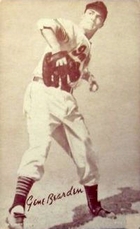Gene Bearden
Ballplayers Wounded in Combat
| Date and Place of Birth: | September 5, 1920 Lexa, AR |
| Date and Place of Death: | March 18, 2004 Alexander City, AL |
| Baseball Experience: | Major League |
| Position: | Pitcher |
| Rank: | Machinist's Mate |
| Military Unit: | US Navy |
| Area Served: | Pacific Theater of Operations |
Henry E. “Gene” Bearden was born in Lexa, Arkansas, on September 5,
1920. Because his father was a machinist with the Missouri Pacific Rail
Road, the family moved frequently and Gene finished high school in
Memphis, Tennessee, where he played first base on the varsity team.
A left-hander, Bearden was signed as a pitcher by the Philadelphia
Phillies organization in 1939. He was assigned to the Moultrie Packers
of the Class D Georgia-Florida League, and had a 5-11 won-loss record
his rookie year. He pitched for the Miami Beach Tigers of the Class D
Florida East Coast League in 1940, where he was 18-10 with a
league-leading 1.63 ERA and circuit-best five shutouts. In 1941, Bearden
was 17-7 with Miami Beach (now known as the Flamingos), then joined the
Savannah Indians of the Class B South Atlantic League. Bearden was sold
to the Yankees organization in June, and joined the Augusta Tigers in
the same league. He was 4-4 in 13 appearances before entering military
service with the Navy.
He took basic training at Great Lakes Naval Training Station, Illinois,
and attended machinist school prior to being assigned to the engine room
of the light cruiser USS Helena (CL-50). The Helena had been at Pearl
Harbor on December 7, 1941, and was badly damaged. Thirty-four of
Helena's sailors were killed and 69 were wounded.
During the battle of Kula Gulf in the Solomons, on July 6, 1943, the
Helena was hit by a Japanese torpedo, tearing off the bow. Minutes later
she was hit by two more. As the crew abandoned ship, Bearden fell from a
ladder on to the deck and was knocked unconscious. As the Helena
disappeared beneath the waves, Bearden was picked up by a destroyer and
returned to the United States. Of the Helena’s nearly 900 crew, 168
died.
Bearden’s right kneecap was crushed beyond repair, the ligaments in his
leg were badly twisted and his skull had been fractured. A metal hinge
was inserted into his damaged knee and plate in his head. He remained in
hospital until receiving a medical discharge in early 1945.
His injuries would bother him for the rest of his life. He needed to
take painkilling drugs and at times he had difficulties seeing.
Nevertheless, the 24-year-old reported to the Binghamton Triplets of the
Class A Eastern League early in 1945. His left-handed knuckleball
produced an impressive 15-5 record with a 2.41 ERA, and his bat
contributed a .274 average with three home runs. In 1946, he was 15-4
with the Pacific Coast League's Oakland Oaks, and although he was with
the Oaks again for the majority of 1947 (16-9 with a 3.38 ERA), he made
his major league debut for the Cleveland Indians on May 10, 1947. In his
only appearance for the Indians that season, he made a seventh-inning
relief appearance against the Browns, and gave up three runs.
His inauspicious start to a big league career was completely turned
around in 1948. Bearden won 20 games and lost just seven for the
Indians. On a pitching staff that included Bob Lemon and Bob Feller, he
out-pitched them both. His 2.43 ERA was best in the American League and
he beat the Red Sox in a one-game playoff for the league crown. The
28-year-old pitched two games in the World Series against the Braves,
including a, 2-0, five-hitter in Game Three.
Unable to repeat his previous performance, Bearden slumped to 8-8 in
1949, and was 1-3 when the Indians traded him to Washington on August 2,
1950. He was picked up by the Tigers at the beginning of 1951, pitched
for the Browns in 1952, and ended his major league career with the White
Sox in 1953.
Bearden was back in the Pacific Coast League in 1954, pitching for
Seattle. He was with San Francisco in 1955 (where he was 18-12) and
Sacramento in 1956 and 1957.
"I don't know what happened." Bearden said back in 1967 while trying to
explain his one year phenom. "Maybe Casey Stengel was right when he said
they'd stop swinging at my low pitch. But there's no use looking back.
You can't live in the past."
He later worked as manager for the Helena, Arkansas, Country Club and
Golf Course, while coaching the American Legion team. Bearden would then
own a restaurant and work as general manager for Plaza Auto Sales in
West Helena.
Gene Bearden passed away on March 18, 2004, in Alexander City, Alabama.
He was 83 years old and is buried at Sunset Memorial Park in Barton,
Akansas.
Date Added January 3, 2018
Can you add more information to this biography and help make it the best online resource for this player? Contact us by email
Read Baseball's Greatest Sacrifice Through The Years - an online year-by-year account of military related deaths of ballplayers
Baseball's Greatest Sacrifice is associated with Baseball Almanac
Baseball's Greatest Sacrifice is proud to be sponsored by


